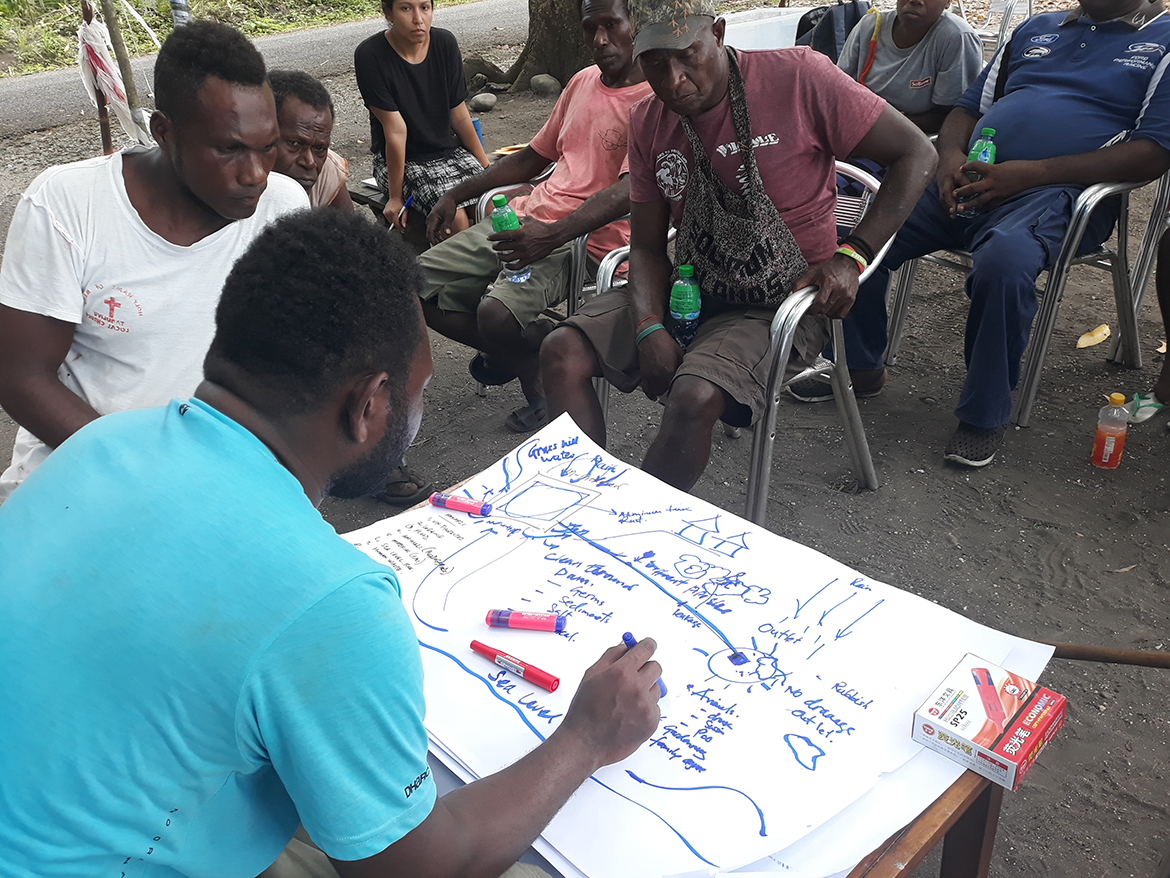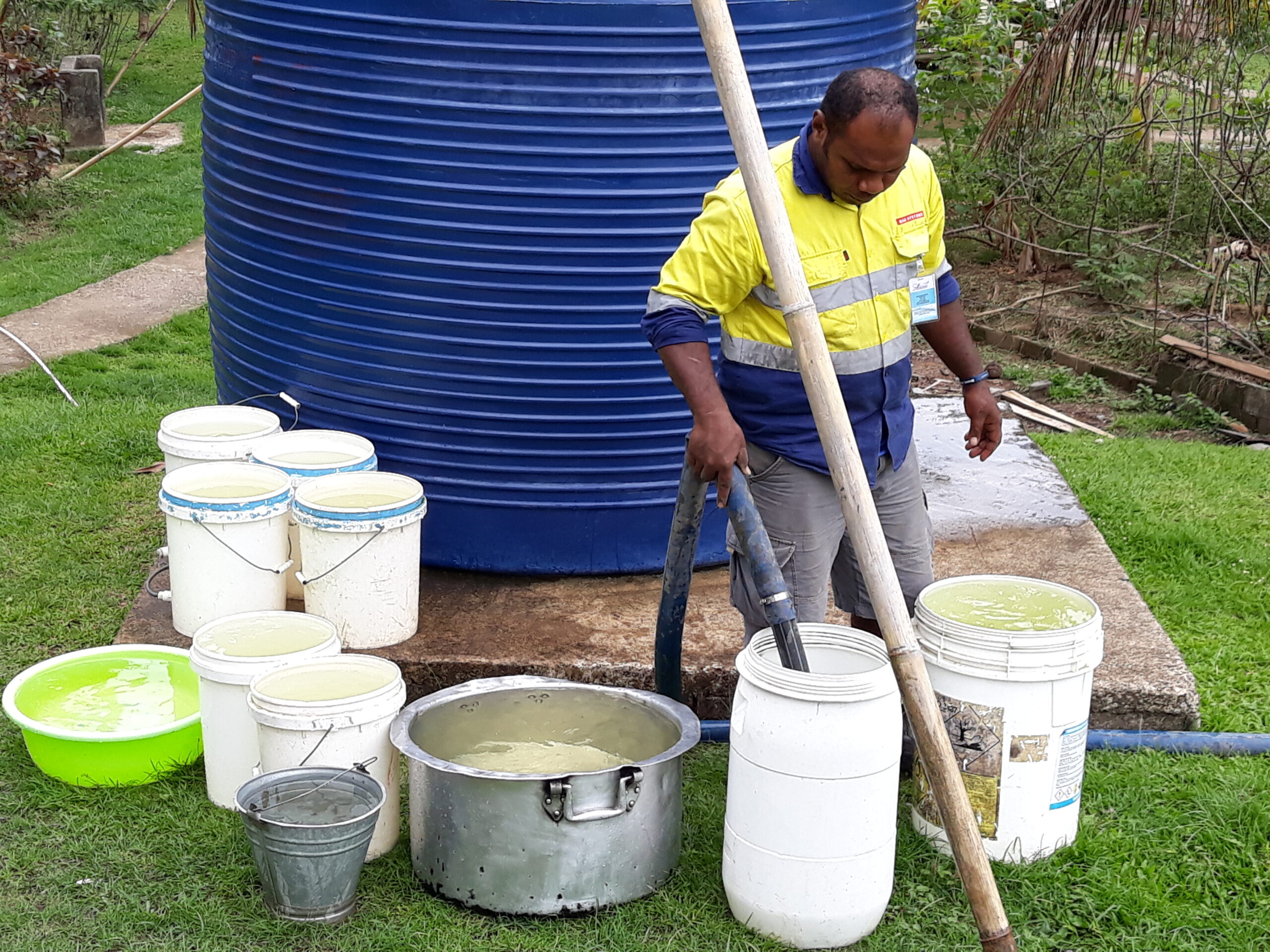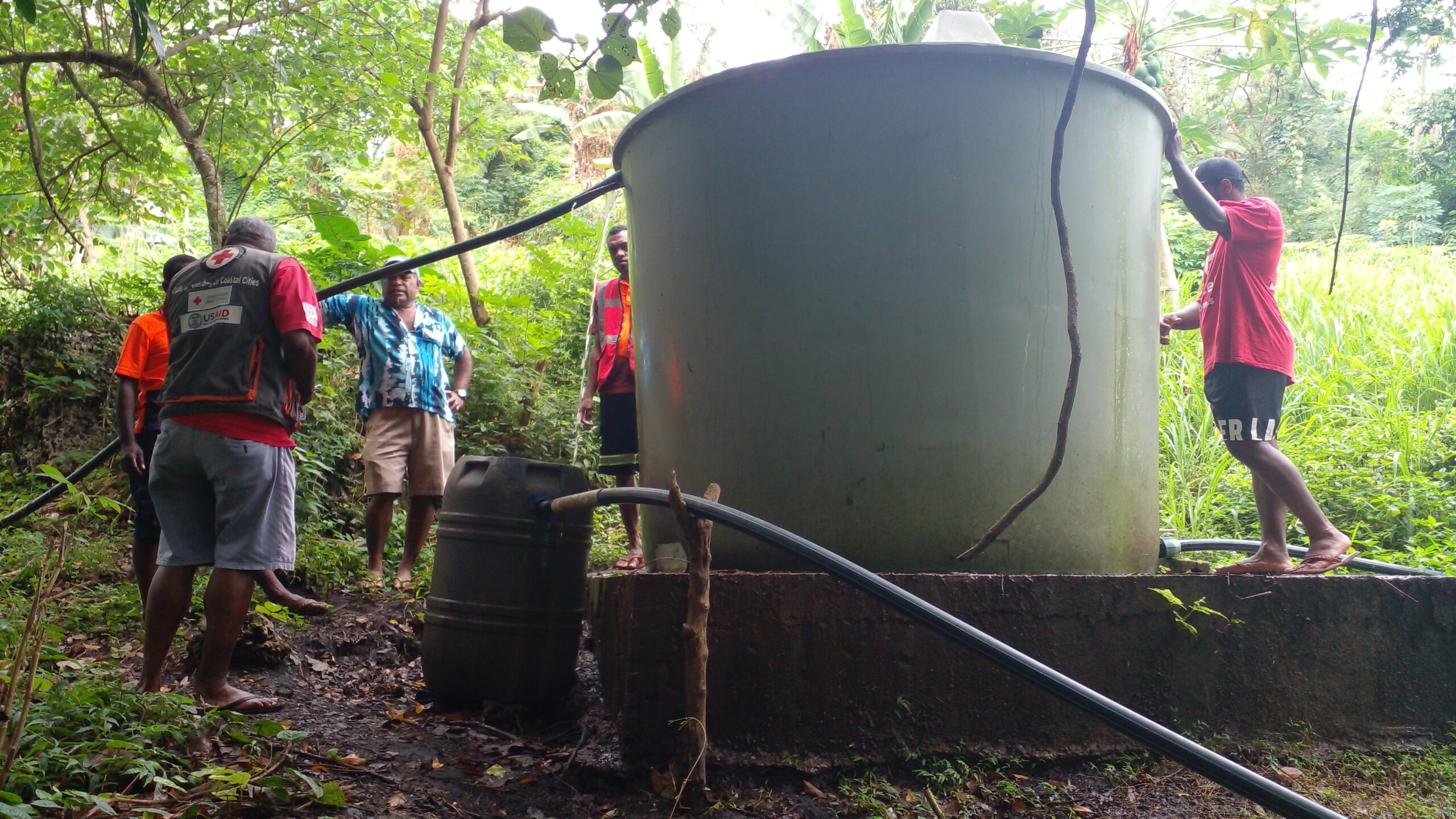
- Research project
- – Western Pacific
Full research title: Supporting decentralised rural water supply in Pacific islands: Formal and informal networks to support Pacific rural Water Committee engagement with water resources management for climate resilient WASH outcomes (PacWaM+ 2)
Duration: January 2023 – December 2024
This project builds on the findings and relationship established during the highly productive Pacific Community Water Management plus (PaCWaM+) program, delving further into some of the key identified knowledge gaps (e.g. decentralisation trends in the WASH sector) and key findings (e.g., leveraging non-WASH networks, localising water safety planning approaches, the benefits of social marketing – not simply educational models – when supporting community water managers) and exploring new focal areas (e.g., a greater emphasis on climate-resilient WASH, the potential role of water committees and other actors to engage in local-level water resource management, and community-led water monitoring).
The team include scholars from The University of the South Pacific (Fiji and Vanuatu) and the Solomon Islands National University, and we are again partnering with numerous government agencies.
In rural Fiji, Vanuatu and Solomon Islands, active and sustainable water committees (WCs) are the key to effective community-based water management (CWM) and thus, to climate-resilient rural water security. These countries are, to varying degrees, all currently decentralising water, sanitation and hygiene (WASH) service and support systems; now is the time to assess and improve these processes. WCs must be day-to-day managers of water resources and WASH systems – adapting to chronic climate changes and preparing for acute climate hazards. However, WCs typically do not endure or function in a sustainable and proactive manner, and there are few examples of WCs engaging in wider water resource management (WRM). WCs need further capacity development with ongoing mentoring, support and motivation. Innovatively leveraging formal, informal and emerging networks – both WASH and non-WASH related – is necessary to provide this support. By non-WASH networks we specifically mean institutions such as rural-urban familial networks (formal and informal), faith based organisations (e.g. church leaders, women’s, men’s and youth groups), market associations and other agricultural networks (e.g. agricultural extension officers), chiefly councils, schools, and more. Our previous research has identified some of these non-WASH networks as important, but largely ignored, components of the wider WASH enabling environment.
Building on our earlier work and ongoing partnerships in these three countries, using both formative and action research combined with two regional knowledge sharing opportunities (two peer-to-peer learning exchange events), this research project seeks to better understand ways that government and civil society organisations (CSOs) engaged in the WASH sector can leverage formal, as well as emergent and informal networks, to further support and strengthen WCs as well as link WRM with community WCs to result in more effective, sustainable and inclusive climate-resilient WASH.

The overarching research question is:
In the context of increasingly decentralizing rural water management in Pacific Island countries, how can formal, informal & emergent networks – both WASH and non-WASH related – better support mobilising and strengthening water committees (WC) to be both WASH and water resource managers who engage with both community and beyond-community factors affecting climate resilience?
There are two groups of guiding sub-questions/research objectives used to address this research question, with RQ1 focused at the village/community level and RQ2 focused at the community and beyond-community level.
RQ1. How can formal, informal and emergent networks (WASH and non-WASH related) be used to improve both the prioritisation of CWM and WC-capabilities for climate-resilient water management:
RQ2. How can WCs be assisted by formal/informal/emergent networks to engage in water resources issues both within their community and with others in their catchment?
Research methodology consists of formative and action research activities, with some variation across the three countries – Solomon Islands, Vanuatu and Fiji – based on contextual factors, geo-specific gaps and opportunities identified in our previous work as well as consultations with relevant stakeholders (e.g. government and CSO actors in all three countries). Research activities are aligned with the afore mentioned sub-questions (RQ1a-b and RQ2 a-b).
A key component of the project is conducting formative research on decentralisation and CWM in each country (RQ1a) to better understand provincial level capacities and constraints to supporting WCs.
Following these formative research activities the results will be analysed and then socialised with key stakeholders to then co-design several pilot action research activities (i.e. the implementation of new check-lists and community engagement approaches, the piloting of alternative follow-up regimes) which will then be monitored and assessed. This design is based on a research-to-policy collaborative (R2PC) approach, which we have used in our previous projects.
Other research activities (consisting of either/or/both formative and action research) vary by country and are as follows:

Our research activities involve, and outputs are intended for, a range of audiences. However, the primary audience are National and Provincial Governments, who can incorporate findings and adopt resources into existing policies and guidelines. Many of the proposed activities and research focal areas have been identified through dialogue with implementing partners in each country. If adopted formally, CSOs and others engaging with communities and government on CWM will be encourage or required to use these outputs. The adoption of these CWM resources will add to existing resources to provide a more holistic and effective approach to CWM.
Communication resources will be publicly available and their use encouraged by other actors, such as Churches and social media groups.
Government staff and community members (WCs) will be directly involved in research activities. We anticipate they will benefit through both participating in research activities where they are exposed to the integration of evidence and knowledge of different forms to formulate actions and guidance, as well as learning about tools and skills that mobilise action and build capacity. It is hoped that, with time, all communities will benefit from more active, inclusive, capable and sustainable Water Committees.
The two regional peer-to-peer knowledge sharing and learning events provide an innovative and welcome opportunity for Pacific Islander scholars and Provincial-level government WASH sector workers from across the region to share their experiences, knowledge, and learnings with one another, contributing to furthering regional momentum and interest in the merits of applied research on water, sanitation and hygiene.
Our Pacific Community Water Management Plus (PaCWaM+) phase one project developed a large number of resources, tools and videos. Discover these resources: https://www.watercentre.org/research/research-impacts/pcwm/
Mark Love, Collin Benjamin, Heather Molitambe
Project Manager
Mark Love
International WaterCentre
